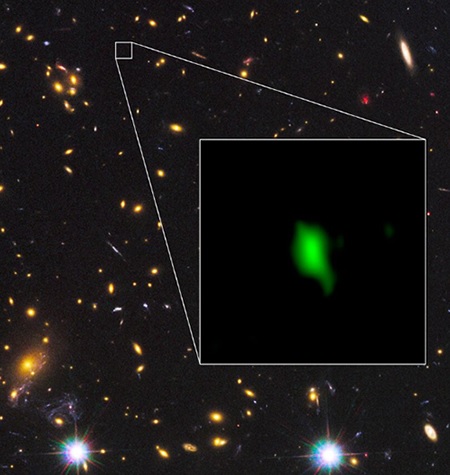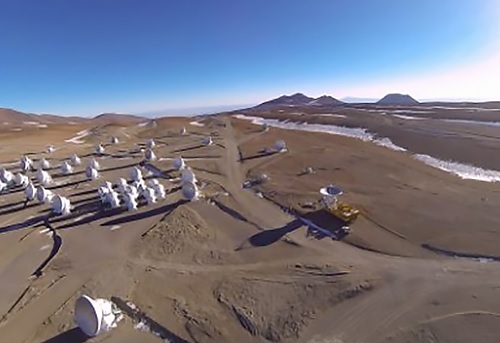News
Sign of Oxygen from 13.28 Billion Years Ago: First Step towards Solving the Mystery of Universe Updated in July 2018
On May 16, a research group led by Osaka Sangyo University and the National Astronomical Observatory of Japan (NAOJ) announced that oxygen has been found in a galaxy located 13.28 billion light-years away from earth. Based on observations by the ALMA telescope in Chile, the paper was published in the British journal Nature.
The research group consisted of Takuya Hashimoto, research scientist for Osaka Sangyo University and NAOJ, and researchers from Hokkaido University, University of Tokyo, Osaka University and other academic institutions. By using the ALMA telescope, the group was able to observe the distant galaxy "MACS1149-JD1," located at 13.28 billion light-years away near the constellation Leo, and were able to analyze observed data. “MACS1149-JD1” is a galaxy originally observed through the Hubble Space Telescope located in the United States.
As a result of analysis, they succeeded in detecting a distinct light which characterized oxygen from the galaxy "MACS1149-JD1." It was found that oxygen existed in the universe, about 13.28 bilion years ago. With this discovery, the farthest record of a galaxy with oxygen was updated by an additional 80 million light years.
The universe was born with a Big Bang 13.8 billion light years ago, and some hundred million years later, it is believed that the first galaxy was born. It is estimated that hydrogen and helium were almost always present immediately after the birth of the universe, but it still has many mysteries. According to the research group, in the galaxy "MACS111-JD1", stars began to form after about 250 million years and oxygen was created among the large mass of stars in space. And it is believed that oxygen was dispersed in space by the supernova explosion experienced by stars coming to the end of their lives. Hashimoto said, "With this discovery, we managed to reach the earliest phase of cosmic star formation history.”
The official name for ALMA is "Atakama Large Millimeter/Submillimeter Array.” It is a radio telescope that has been in use since 2011 and boasts a very high resolution. With international collaboration between Japan, the United States, Europe and other countries, ALMA was built at an altitude of 5,000 meters above the Atacama Desert in northern Chile. 66 parabolic antennas, each measuring about 12 meters in diameter are connected together to operate like one giant telescope. For Japan, NAOJ takes part in ALMA’s operation.
https://ALMA-telescope.jp/en/news/press/oxygen-201803

Image 1: A synthesized image combining the image of Galaxy MACSJ1149.5 + 2223 taken by the Hubble Space Telescope, and the image of MACS1149-JD1 captured by the ALMA telescope. In reality, MACS111-JD1 is far more distant than the cluster of galaxies, but when viewed from earth, it appears to be overlapping by coincidence. In this image, the oxygen observed by ALMA is expressed in green color. (Image caption wording by research teams of Osaka Sangyo University, NAOJ et al.) <Credit: ALMA (ESO/NAOJ /NRAO), NASA/ESA Hubble Space Telescope, W. Zheng (JHU), M. Postman (STScI), the CLASH Team, Hashimoto et al>

Image 2: The ALMA Telescope was built in the Atakama Desert in northern Chile, at 5000 meters above sea level. <Credit: National Astronomical Observatory of Japan>







